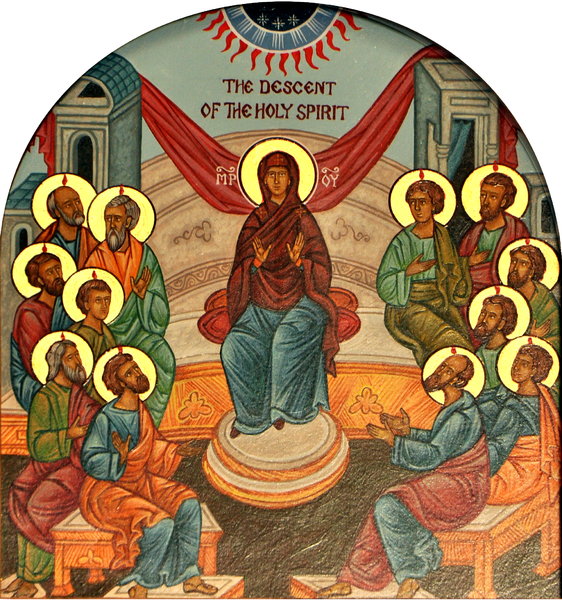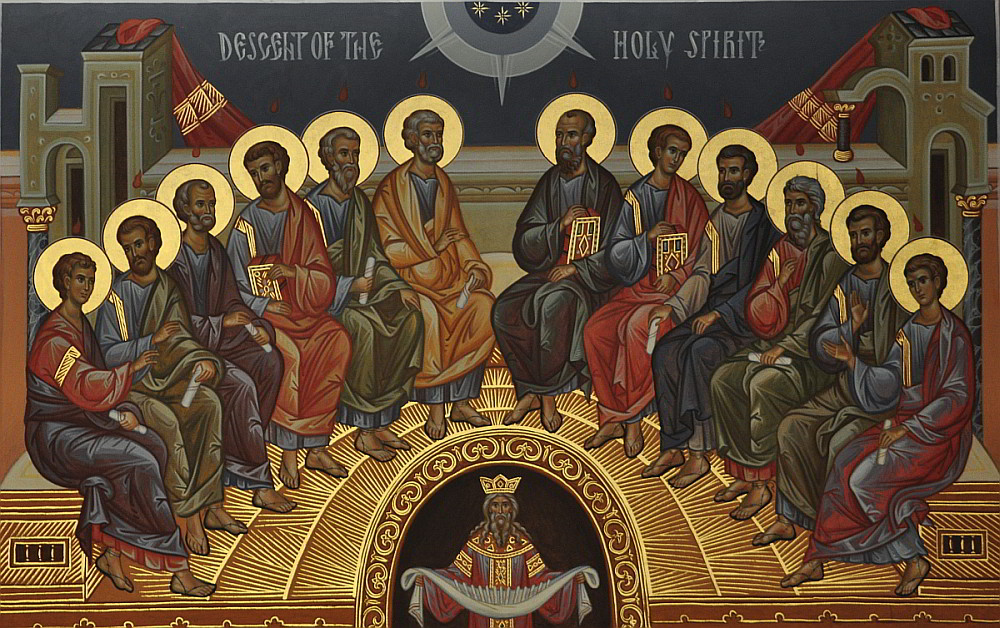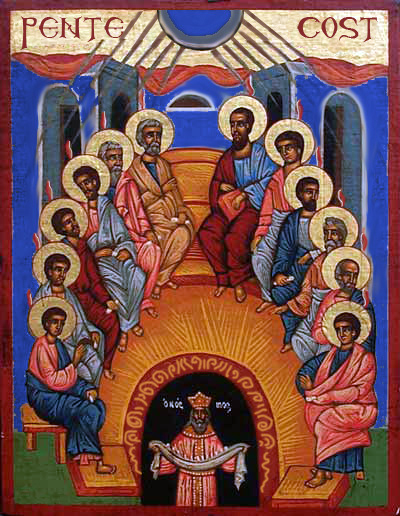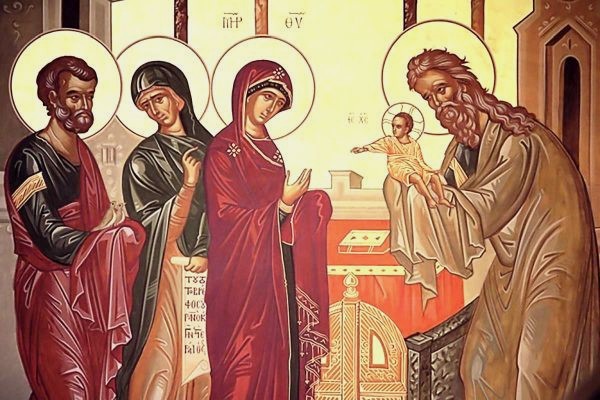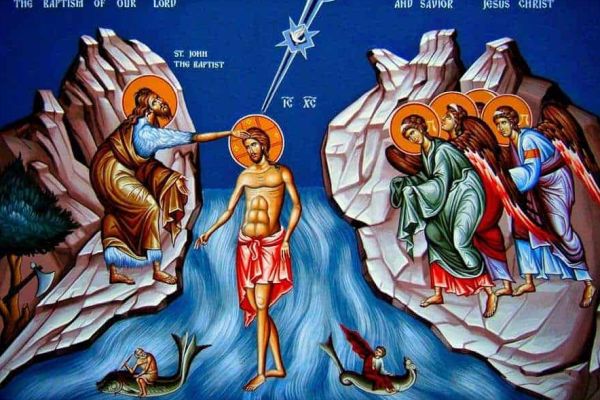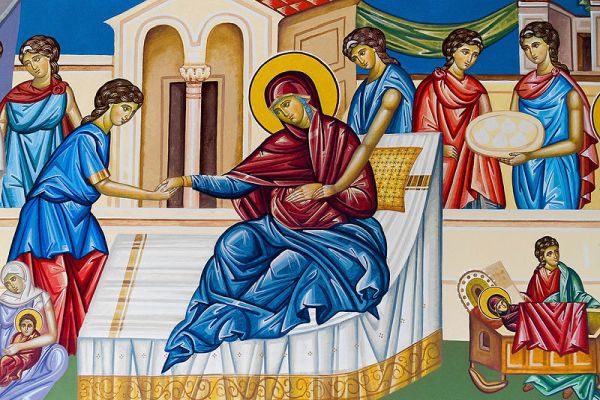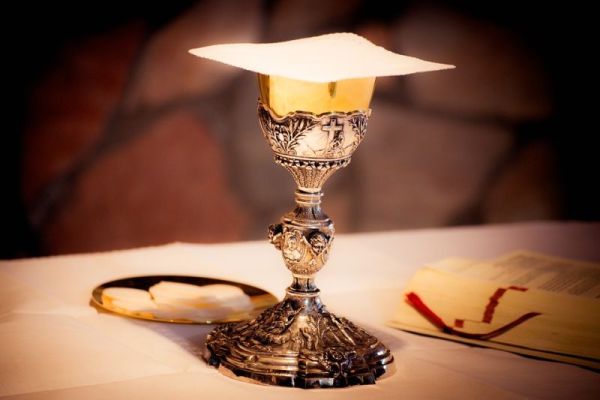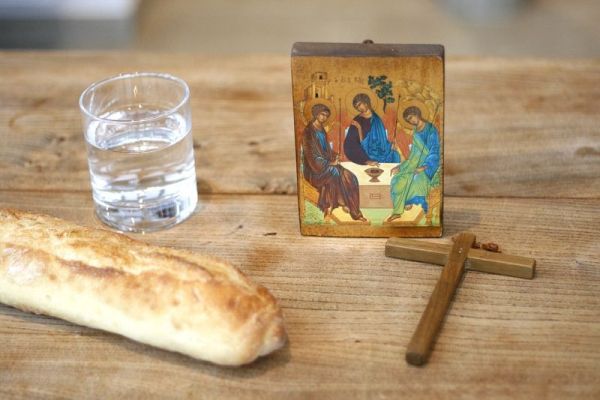The Feast of Pentecost
The Feast of Pentecost (also called Trinity Day) is one of the 12 great feasts of the Orthodox Church and is often known as the birthday of the Church because it celebrates the descent of the Holy Spirit upon the Apostles and other disciples of Christ, marking the beginning of the Church’s mission to the world.
Background of the Feast
This event happened during the Jewish feast of Shavuot which is called in English as the ‘Feast of First Fruits”1 or the “Feast of Weeks”2. The feast was celebrated during the end of the harvest season in May-June, during which the Israelites used to offer the first fruits of the harvest3 as a thanksgiving offering to God in the temple in Jerusalem. It is called Pentecost (fiftieth day) in Greek because this feast took place fifty days after the Jewish Passover.
The feast of Pentecost was a pilgrim festival, which meant that according to Jewish Law, all the adult Jewish men had to come from wherever they were living to personally celebrate the feast in the Temple. This is the reason why there were so many Jews from all over the world in Jerusalem on this feast day when the Holy Spirit came upon the Apostles.
Later, this Jewish feast was transformed into a Christian festival by the Church to celebrate the first coming of the Holy Spirit upon the followers of Christ and to remember the 3000 ‘first fruits’ that were added to the Church that day.
The Event
St. Luke describes this even in the in the Acts of the Apostles (Acts 2:1–41). Just before the Lord Jesus Christ ascended into heaven, He told His disciples to wait in Jerusalem for the promised gift of the Holy Spirit from God the Father, which would fill them with power “from on high”. So the disciples did just that, spending their time in prayer together. The first Christians at this time included the Apostles, some women, the Theotokos and the brothers of the Lord Jesus4.
Then, just ten days after the Ascension, on the Day of Pentecost, while they were gathered together in prayer, suddenly the sound of a mighty rushing wind came down from heaven, and there appeared tongues of fire that rested upon each of the disciples. St. Luke further records that “All of them were filled with the Holy Spirit and began to speak in other tongues…”
Obviously all of this attracted the attention of many outside, who gathered around to know what was happening. Many Jewish pilgrims from all over the world were there in Jerusalem on account of their pilgrimage for Pentecost. These Jews were astonished to hear the disciples speaking in the various languages from all over the Mediterranean world.
Initially everyone thought the disciples were drunk on wine. But then St. Peter came out and told them that this was actually the fulfillment of the Prophet Joel’s prophecy that God would send His Spirit upon all flesh in the last days5. He then went on to preach the Good News of the Kingdom and 3000 people repented and were baptized that very day, resulting in the birth of the Church6.
The rest of the Book of Acts continues to record the growth of the Church and its mission to the world through the miraculous outpouring of the Holy Spirit that began on the Feast of Pentecost.
Photo by Fr Ted is licensed under CC BY-SA 2.0
Significance of the Pentecost Event
Pentecost is the second most important feast of the church year, second in importance only to Easter itself and that is because of the coming of the Holy Spirit upon the Church. During the Old Testament period the Spirit of God would only occasionally fall upon the prophets and empower them, but from the Day of Pentecost we see that the Holy Spirit came to stay forever upon the followers of Christ, just as He had promised.
• Constant Companion – This is the reason why the Apostles were not sad after the Lord Jesus Christ’s ascension into heaven. Though He was leaving them, He had promised them that His presence would always be with them through the Holy Spirit, who would be their Helper and Comforter.
• Source of Power – The Lord Jesus had given His disciples His final mandate to go to all the world and make disciples (the Great Commission) but in order to accomplish this, they had to first wait for the Holy Spirit who would empower them7. And on the Day of Pentecost, the apostles who were hiding for fear of the Jews, did indeed receive “the power from on high”, and they were changed into courageous souls who began to preach and bear witness to Jesus as the risen Christ and Lord. It was the power of the Holy Spirit that emboldened them to face persecution and ultimately even martyrdom for the sake of Christ.
• Trinity revealed – Although the Holy Spirit was seen on earth earlier in the form of a dove at the baptism of Christ, it was on Pentecost that the Holy Spirit was clearly manifested as the power and presence of God who would henceforth dwell within all the followers of Christ. This event was the final act of God’s self-disclosure to all creation, and so helped to further the realization of the Church that God was no more “One” as had been believed by the Jews but Three Persons in One! That is why the hymns and liturgies of the Church on this feast day, in addition to celebrating the coming of the Holy Spirit, also celebrates the full revelation of the divine Trinity. And it is for this reason that Pentecost Sunday is also called Trinity Day in the Orthodox tradition.
• Beginning of the Church’s mission – The Ascension of Christ marked the end of Christ’s earthly mission but Pentecost marks the continuation of His mission through His disciples. Their training being over, now the Spirit of God filled them with the power and boldness needed to spread the message of the Gospel in Jerusalem, and then to all nations, baptizing them in the name of the Father, Son and the Holy Spirit.
• Beginning of the Messianic Age – The Prophet Joel had prophesied that the Holy Spirit would be poured out on all flesh in ‘the last days’. So the Church considers Pentecost as the beginning or the inauguration of the messianic age of the Kingdom of God, mystically present in His Church. That is why Pentecost is called an apocalyptic (revelation) and eschatological (final end) day.
These are the various reasons as to the importance of Pentecost, and its observation was also held in importance from the very early history of the Church. Along with Easter, Pentecost was also considered as the ideal day for the baptism8 of the new converts from the second century9. This day is also given much prominence in the Liturgical year of the Church because all the Sundays (and other days) until the start of the next Great Lent are numbered from Pentecost – eg. “Second Sunday after Pentecost”. Even St. John Chrysostom said in the fifth century about Pentecost: “Today we have arrived at the peak of all blessings, we have reached the capital of feasts, and we have obtained the very fruit of the Lord’s promise.”
How the Feast is celebrated
The feast always falls on a Sunday and so is always celebrated with the Divine Liturgy. For many of the orthodox churches, the observation of this feast does not end here; the afterfeasts continue into the following days (though the number of days may vary according to the particular traditions). For the Indian orthodox churches, the Season of Pentecost begins with this Feast and continues until the eve of the Feast of the Transfiguration (August 6).
Three Part Liturgy: In the Indian churches, the Divine Liturgy is divided into three parts to celebrate the Holy Trinity: the first is addressed to God the Father, the second to God the Son, and the third to the Holy Spirit. These have been done to meditate on the three phases of the Work of the Three Persons of the Trinity – Creation, Redemption and Indwelling.
Kneeling Prayers: The main part of the Pentecost celebration are the ‘Kneeling Prayers’. In the Eastern Orthodox churches, on the night of Pentecost, the faithful kneel prostrate during three sets of prayers composed by St. Basil the Great. This is significant because this is the first time that prostrations are permitted after the Holy Week. In the Indian churches, the celebrants and the congregation also kneel before the altar at the end of each of the three phases of the Divine Liturgy, gently touching one another’s back with the tips of their fingers to alert each other, as did the disciples at the time of the descent of the Holy Spirit upon them, to prepare themselves for the coming of the Comforter. Everyone repeatedly chants ‘Kurielaison’ (Syriac for “Kyrie Eleison”) until the Celebrant prays the final prayer.
Sprinkling of water: After the kneeling prayers, the celebrant sprinkles water on the altar, the clergy and the congregation to symbolize our receiving of the power of the Holy Spirit at the time of our baptism (chrismation). This is in reference to the words of Christ who said of the Holy Spirit “If any man thirsts, let him come to Me and drink…out of his belly shall flow rivers of living water”10.
Color: The liturgical color that is associated with the feast of Pentecost is green, and so the orthodox churches are usually decorated with a lot of greenery and flowers during the feast. This is very similar to the Jewish harvest festival of Shavuot, and is a reminder that we the faithful are called to continually bear the fruits of the Holy Spirit.
Theological implications of the Feast
The Church is the new Israel: The Pentecost event is the final fulfillment of the promise God made to Abraham to bless the whole world through him11. This was fulfilled through the Holy Spirit descending on Pentecost and making it possible for all peoples of the world (Gentiles) to be the spiritual descendants of Abraham and heirs of the divine promises. So now we know that the Church is the new Israel and Pentecost was the final phase in the fulfillment of God’s plan of salvation that was made before the foundation of the world.
Affirmation of the Gospel mandate: The Church Fathers also taught that Pentecost is the reversal of the Tower of Babel event. At Babel, human pride resulted in birth of many languages which created much confusion. But in Pentecost, the Spirit of God enabled unity through the diversity of tongues in order to bring about the salvation of many souls. As the Church Fathers taught, the purpose of the gift of tongues was affirm that the Gospel was to be proclaimed all over the earth in all languages.
Giver of Gifts: While empowering us for the work of the Gospel, the Holy Spirit also gives us several gifts whereby we can edify the body of Christ. As is expressed in one of the liturgical hymns of Pentecost: “The Holy Spirit provides every gift: He inspires prophecy, perfects the priesthood, grants wisdom to the illiterate, makes simple fishermen to become wise theologians, and establishes perfect order in the organization of the Church.” As St. Paul told the Corinthian church, all of us are given different gifts but we should remember that the source of them is the same Holy Spirit who has given them to us to build up the Church, and one another .
Our own Pentecost: To Orthodox Christians, the feast of Pentecost is not just a celebration of an event which took place centuries ago. It is also a celebration of our membership in the Church because every Christian has experienced Pentecost and received “the seal of the gift of the Holy Spirit” through the sacrament of chrismation. We are the temples of the Holy Spirit and God dwells in us.
Source of Theosis: St. Peter reminds us that with this great privilege comes the responsibility to lead holy lives as is demanded by the holiness of God who told Israel “Be holy, for I am holy” . But we know that, as humans, it is impossible to avoid sin. That is why even God lamented in Deuteronomy 5:29, “O, that they had such a heart in them that they would fear Me and always keep My commandments so that it would be well with them and their children forever!” It is clear that mankind is always rebellious and sinful. What is needed is a change of heart and mind, and that is why the Holy Spirit was given to us – to regenerate us and change us from glory to glory.
And how does that happen? The Lord Jesus told His disciples that the first work of the Holy Spirit would be to help His followers understand God’s ways and will. John 14:26 records that “He will teach you all things and bring to your remembrance all things that I said to you”. Again Jesus said of the Holy Spirit “He will testify of Me” (John 15:26), and that the Holy Spirit would guide us “into all truth” (John 16:13).
So that is why Pentecost is so important for us. It reminds us that we have been given the greatest gift – God Himself, His Spirit residing within us, teaching us what is right, convicting us of our sins and guiding us to the Truth that is Jesus Christ our Lord Himself. And on the feast of Pentecost, we will once again pray, as we do daily, to walk in the light of the Spirit so that we can live our lives according to the will of God and so become more and more like our Lord Jesus daily.
To learn more about the significance of Pentecost and its icon click here
1This feast is mentioned in the Pentateuch five times — in Exodus 23, Exodus 24, Leviticus 16, Numbers 28, and Deuteronomy 16.
250 days after the Passover meant 7 weeks (49 days) and so it was considered a week of weeks; hence the name ‘Feast of Weeks’.
3See Exodus 34:22.
4Acts 1:14.
5Joel 2:28-31, which is quoted by St. Peter in Acts 2:16-2 .
6Theologically, the Orthodox do not consider Pentecost to be the “birthday” of the Church because they consider the Church as having existed before the creation of the world.
7See John 14:26, 15:26; Luke 24:49; Acts 1:5.
8In England the feast was commonly called White Sunday (Whitsunday) for the special white garments worn by the newly baptized.
9Tertullian witnesses to this in his work ‘On Baptism’, chapter 19. See
10John 7:37.
11Genesis 12:3.
